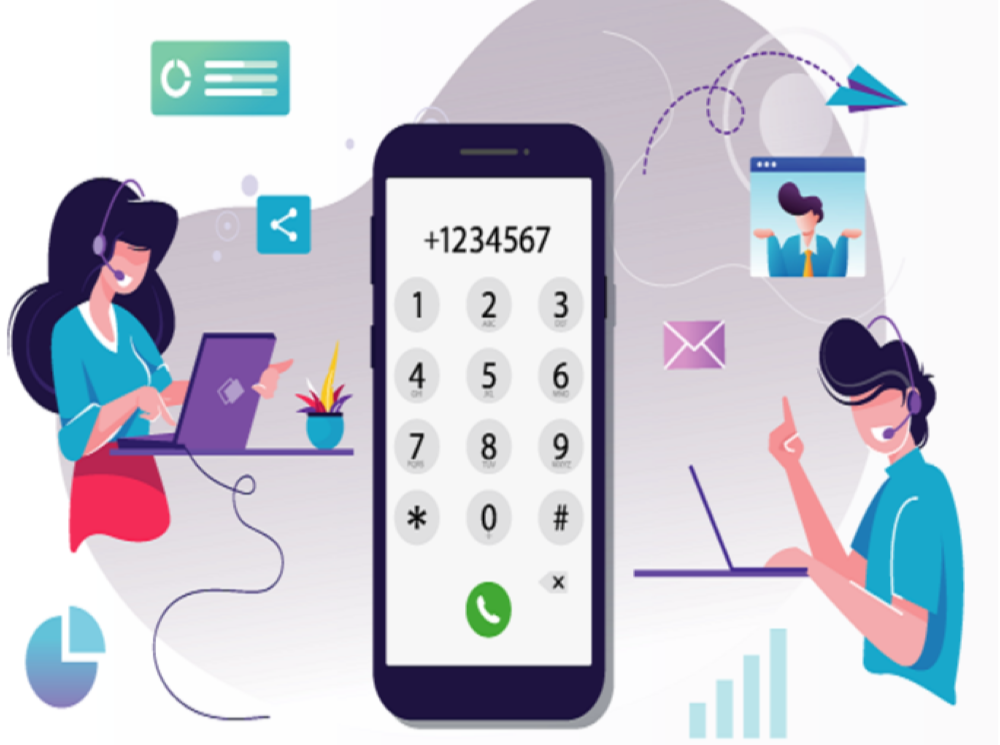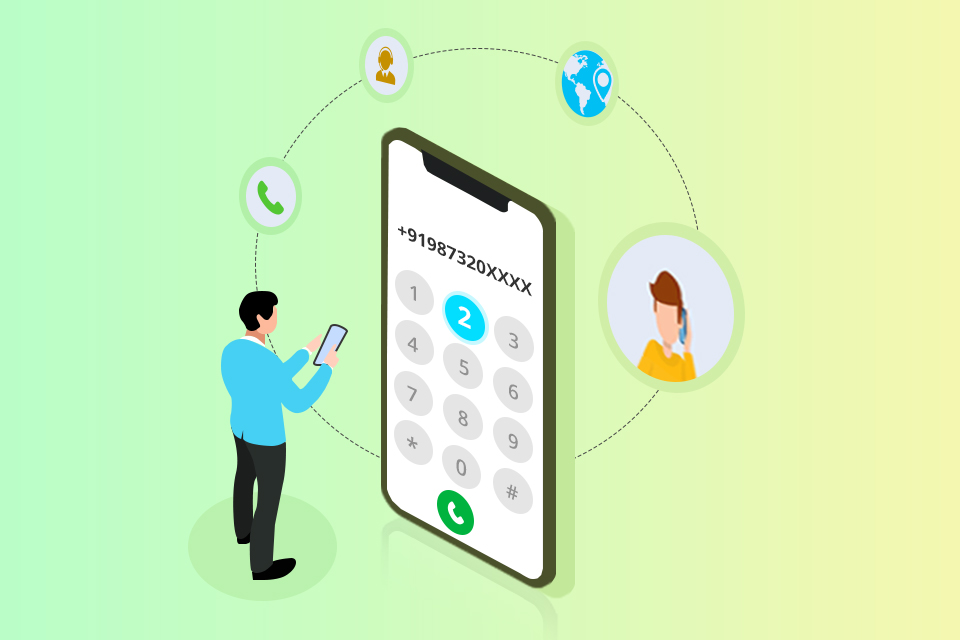Virtual Numbers Explained: How They Simplify Business Communication
Virtual numbers are phone numbers that function using the internet instead of regular landlines.

Long gone are the days when businesses and professionals who handle sensitive information could rely on face-to-face communication; these days, privacy and security in client communications are paramount. Virtual numbers can help with communication privacy so it is flexible, economical, and offers more protection to your data. In this article, we will look at ways how you can use virtual numbers to enhance the levels of privacy and security, their advantages, and some tips for implementing them correctly.
Virtual Numbers: What They Are and How They Work
Virtual numbers are phone numbers that function using the internet instead of regular landlines. A virtual number is always a cloud phone number—contrary to a traditional phone number that exists on one device; it can be accessed from different devices, including a laptop, smartphone or tablet. This flexibility, in turn, makes virtual numbers great for professionals who might work from home or deal with a lot of client communications. They are widely applied in customer care, sales and all kinds of businesses that require verbal interaction but would prefer to not share any personal phone numbers.
Virtual numbers offer a wider range of control and customization — these functionality options are often viable with the help of other tools — with capabilities like call forwarding, trigger messages, encryption features, etc. due to the internet dependence on these types as well. They allow you to boost your communication management and increase privacy because the real number is safe. Using virtual numbers for outgoing calls enables professional phones to communicate with clients while keeping a very high level of security regarding sensitive data-managed legal, healthcare, and financial services.
Why do You Need Privacy and Security in Your Client Communication?
For example, industries with a focus on client confidentiality (healthcare, legal, and finance) need to protect communication channels too. Normal phone lines are used to wiretap, thus rendering it hard to keep certain conversations confidential. Data breaches come with a hefty price tag both in dollars and corporate reputation. Thus, client data has been protected via secure channels, which is now an inseparable part of any business.
One of the crucial parts about this is also making use of virtual numbers that let businesses implement strict control and monitoring over communication. Virtual numbers help protect sensitive information by giving a secure, private way to communicate that keeps unwanted people out. They secure client communications so that there are limited chances of violation, ID robbery, and fraudulent use of information.
Why Virtual Numbers Are Better for Privacy
So here, using virtual numbers are the thing which is quite an effective strategy to increase the security of client communication in many ways. Professionals can keep themselves away from sharing their actual number or any other business number with clients because it could get messy. It avoids any unwanted or unauthorized contact beyond business time and thus helps to keep your personal information safe. Virtual numbers not only eliminate the prospect of workplace drama due to personal and professional communication, but they also enable all client interactions to be private between a limited number of people.
Additionally, virtual number enable businesses to issue unique Numbers for different clients, departments or teams thereby improving privacy and data tracking. Sales department can have a virtual number dedicated for them to receive the call on a different line than customer service so you are separate of client data within your departments. That compartmentalization limits the sharing of data between departments, adding another layer of privacy and security.
Here are some of the top security benefits you can get from virtual numbers.
The key highlight of virtual numbers that makes them most preferred among the making professionals is their extensive range of integrated security features. While these features are not generally offered with traditional phone systems, they make virtual numbers especially attractive for businesses looking to communicate with clients securely.
To begin with, virtual numbers provide end-to-end encryption for calls and messages which is vital to safeguard private data. Under end-to-end encryption, data appears encrypted to outsiders as it is encoded on the sender side and can only be decoded by the destination allowing no external party access. A secure channel for conversations with sensitive data is provided by this feature.
Call Recording/Monitoring Another Capabilities of Call Center Software It enables businesses to record and monitor conversations for quality assurance, training or compliance with the virtual numbers of executive call-forwarding within Singapore. On the other hand, call recording features contribute to security by keeping a history of client communications so that you can listen back to calls if needed and pinpoint any breaches or issues.
Another feature that can also secure you is call forwarding. It makes sure that if a call remains unanswered, it can be forwarded to a secure voicemail or another team. With this feature, businesses can manage client communications without a hitch and securely if the main practitioner is out of the office. Additionally, virtual numbers normally provide you with sophisticated authentication features to authenticate users before being able to access the number or other data related to it to make sure only authorized personnel can view sensitive client information.
The Advantages of Virtual Numbers When It Comes to Secure Communication with Your Clients
Virtual numbers can be very beneficial for improving the security of your client communications. For starters, virtual numbers are so much customizable as businesses can organize the call settings, working hours and security preferences to suit their needs. This type of flexibility allows businesses to stay in control of the client interaction and it becomes very easy to maintain a degree of confidentiality during the communication.
No. Another advantage is looking for and processing of speech data. By gaining information regarding call lengths, frequency, and patterns through virtual numbers, companies can easily recognize any odd or inappropriate behavior. As an example, if there is a surge in the number of calls made to your virtual number after hours, this might indicate a possible security threat. These data-driven insights will help you get out in front and prevent abuse before it becomes a bigger issue, keeping client information safe.
Another major benefit: cost-effectiveness. Virtual numbers are usually cheaper than the traditional phone lines and they do not have any additional hardware cost, adding them as a low-cost option for all sizes of business. Virtual numbers provide a cost-effective way for small businesses and startups to create secure and professional communication channels with clients without investing in expensive infrastructure.
How to use virtual numbers strategically, safely
To achieve privacy and safety benefits from virtual numbers, an effective virtual number strategy must be applied. First, the companies must select a virtual number provider that focuses on data security. Seek providers who are highly regarded, have transparent privacy policies, and deploy features (such as encryption and multi-factor authentication) that reduce security risks. You can research reviews on providers and certifications like ISO 27001, which ensures a standard in terms of data safety, to know you are choosing right one.
Finally, set up robust access controls across your enterprise. Decide who gets access to each virtual number and track usage regularly. This way, you have assigned each team or department a separate virtual number so that they do not come beyond the privacy boundaries, giving it an extra edge to restrict personnel limits and avoid data access leaks.
Finally, integrating virtual numbers with a customer relationship management (CRM) system also improves security: since this way all logs get collected in one place. Using a CRM, businesses track all client touchpoints in one-source database which enables for easier data monitoring, security and analysis. CRM integration also gives businesses more security than keeping communication records elsewhere, preventing data breaches while making it easy to follow proper industry protocols.
Challenges Associated with Virtual Numbers
Although there are great privacy and security advantages to virtual numbers, challenges also exist. For example, it can depend on good internet connection. When the internet connection is not stable, it may lead to interruption in call communications made from virtual numbers. Companies that depend on virtual numbers, for example, ought to guarantee they have consistent and stable internet service to dodge interference.
There are also storage and backup aspects. As for all the communications via virtual numbers, the records and call logs are usually available in a digital format. So, it is important for businesses to have a proper data backup plan to ensure the availability of records when there is a system failure. Security configurations for the virtual number accounts should also be updated on a regular basis to ensure maximum data protection.
Finally, businesses need to be aware of the evolving regulations regarding client data confidentiality the General Data Protection Regulation (GDPR) and California Consumer Privacy Act (CCPA). Regulations that require certain processes to be followed when it comes to the storage, access, and security of client data. Now, businesses can avoid any legal complications and keep the trust of their clients only when they understand such regulations.
Conclusion
Virtual numbers provide a solid foundation for boosting privacy & security in client communications. The virtual number allows for extensive control over how each client interaction is handled by keeping personal and professional communication channels separate, allowing the encryption of data, and offering advanced call management features. If implemented properly, businesses can create secure, trusted and cost-effective communication channels without compromising client privacy or data. Virtual numbers serve as an ideal solution for organizations, irrespective of size, catering for the privacy concerns of today’s world with their high-end security features and operational flexibility.


